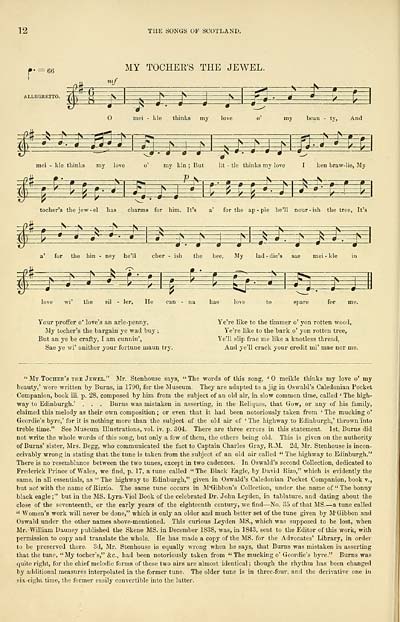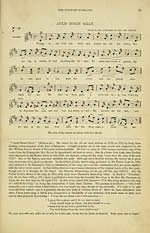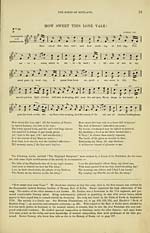Glen Collection of printed music > Printed music > Wood's edition of the songs of Scotland
(36) Page 12 - My tocher's the jewel
Download files
Complete book:
Individual page:
Thumbnail gallery: Grid view | List view

12
THE SONGS OF SCOTLAND.
f = 66
ALLEGRETTO.
MY TOCHER'S THE JEWEL.
fes
mf
s
^^
s-1-
mei - kle thinks my love
my beau - ty, And
— » — a . d F4 -4—A d»
^=^^
^
s
&*
mei - kle thinks my love
J • 4 *— 4~
o' my kin ; But
lit - tie thinks my love
4—
I ken braw-lie, My
-P-fv
i— p ^ [V 4_|^_|!^zipzzy:
4*
ft!
:£j=t
£=E=£=E
=*->-
-•—-•■
tocher's the jew -el has charms for him. It's a' for the ap-ple he'll nour-ish the tree, It's
m
j*= s--4^ — fr :
^4-
S=*
a' for the hin - ney he'll cher - ish the bee, My lad - die's sae mei - kle
*=£
s?
$ :
love wi' the sil - ler, He can - na hae love
spare
for me.
Your proffer o' love's an arle-peuny,
My tocher's the bargain ye wad buy ;
But an ye be crafty, I am cunnin',
Sae ye wi' anither your fortune maun try.
Ye're like to the timmer o' yon rotten wood,
Ye're like to the bark o' yon rotten tree,
Ye'll slip frae me like a knotless thread,
And ye'll crack your credit mi' mae nor me.
" My Tocher's the Jewel." Mr. Stenhouse says, " The words of this song, ' meikle thinks my love o' my
beauty,' were written by Burns, in 1790, for the Museum. They are adapted to a jig in Oswald's Caledonian Pocket
Companion, book iii. p. 28, composed by him from the subject of an old air, in slow common time, called ' The high-
way to Edinburgh.' . . . Burns was mistaken in asserting, in the Keliques, that Gow, or any of his family,
claimed this melody as their own composition ; or even that it had been notoriously taken from ' The mucking o'
Geordie's byre,' for it is nothing more than the subject of the old air of ' The highway to Edinburgh,' thrown into
treble time." See Museum Illustrations, vol. iv. p. 304. There are three errors in this statement. 1st, Burns did
not write the whole words of this song, but only a few of them, the others being old. This is given on the authority
of Burns' sister, Mrs. Begg, who communicated the fact to Captain Charles Gray, R.M. 2d, Mr. Stenhouse is incon-
ceivably wrong in stating that the tune is taken from the subject of an old air called " The highway to Edinburgh."
There is no resemblance between the two tunes, except in two cadences. In Oswald's second Collection, dedicated to
Frederick Prince of Wales, we find, p. 17, a tune called " The Black Eagle, by David Rizo," which is evidently the
same, in all essentials, as " The highway to Edinburgh," given in Oswald's Caledonian Pocket Companion, book v.,
but not with the name of Rizzio. The same tune occurs in M'Gibbon's Collection, under the name of " The bonny
black eagle ;" but in the MS. Lyra- Viol Book of the celebrated Dr. John Leyden, in tablature, and dating about the
close of the seventeenth, or the early years of the eighteenth century, we find — No. 35 of that MS. — a tune called
" Women's work will never be done," which is only an older and much better set of the tune given by M'Gibbon and
Oswald under the other names above-mentioned. This curious Leyden MS., which was supposed to be lost, when
Mr. William Dauney published the Skene MS. in December 1838, was, in 1843, sent to the Editor of this work, with
permission to copy and translate the whole. He has made a copy of the MS. for the Advocates' Library, in order
to be preserved there. 3d, Mr. Stenhouse is equally wrong when he says, that Burns was mistaken in asserting
that the tune, " My tocher's," &c, had been notoriously taken from " The mucking o' Geordie's byre." Burns was
quite right, for the chief melodic forms of these two airs are almost identical ; though the rhythm has been changed
by additional measures interpolated in the former tune. The older tune is in three-four, and the derivative one in
six-eight time, the former easily convertible into the latter.
THE SONGS OF SCOTLAND.
f = 66
ALLEGRETTO.
MY TOCHER'S THE JEWEL.
fes
mf
s
^^
s-1-
mei - kle thinks my love
my beau - ty, And
— » — a . d F4 -4—A d»
^=^^
^
s
&*
mei - kle thinks my love
J • 4 *— 4~
o' my kin ; But
lit - tie thinks my love
4—
I ken braw-lie, My
-P-fv
i— p ^ [V 4_|^_|!^zipzzy:
4*
ft!
:£j=t
£=E=£=E
=*->-
-•—-•■
tocher's the jew -el has charms for him. It's a' for the ap-ple he'll nour-ish the tree, It's
m
j*= s--4^ — fr :
^4-
S=*
a' for the hin - ney he'll cher - ish the bee, My lad - die's sae mei - kle
*=£
s?
$ :
love wi' the sil - ler, He can - na hae love
spare
for me.
Your proffer o' love's an arle-peuny,
My tocher's the bargain ye wad buy ;
But an ye be crafty, I am cunnin',
Sae ye wi' anither your fortune maun try.
Ye're like to the timmer o' yon rotten wood,
Ye're like to the bark o' yon rotten tree,
Ye'll slip frae me like a knotless thread,
And ye'll crack your credit mi' mae nor me.
" My Tocher's the Jewel." Mr. Stenhouse says, " The words of this song, ' meikle thinks my love o' my
beauty,' were written by Burns, in 1790, for the Museum. They are adapted to a jig in Oswald's Caledonian Pocket
Companion, book iii. p. 28, composed by him from the subject of an old air, in slow common time, called ' The high-
way to Edinburgh.' . . . Burns was mistaken in asserting, in the Keliques, that Gow, or any of his family,
claimed this melody as their own composition ; or even that it had been notoriously taken from ' The mucking o'
Geordie's byre,' for it is nothing more than the subject of the old air of ' The highway to Edinburgh,' thrown into
treble time." See Museum Illustrations, vol. iv. p. 304. There are three errors in this statement. 1st, Burns did
not write the whole words of this song, but only a few of them, the others being old. This is given on the authority
of Burns' sister, Mrs. Begg, who communicated the fact to Captain Charles Gray, R.M. 2d, Mr. Stenhouse is incon-
ceivably wrong in stating that the tune is taken from the subject of an old air called " The highway to Edinburgh."
There is no resemblance between the two tunes, except in two cadences. In Oswald's second Collection, dedicated to
Frederick Prince of Wales, we find, p. 17, a tune called " The Black Eagle, by David Rizo," which is evidently the
same, in all essentials, as " The highway to Edinburgh," given in Oswald's Caledonian Pocket Companion, book v.,
but not with the name of Rizzio. The same tune occurs in M'Gibbon's Collection, under the name of " The bonny
black eagle ;" but in the MS. Lyra- Viol Book of the celebrated Dr. John Leyden, in tablature, and dating about the
close of the seventeenth, or the early years of the eighteenth century, we find — No. 35 of that MS. — a tune called
" Women's work will never be done," which is only an older and much better set of the tune given by M'Gibbon and
Oswald under the other names above-mentioned. This curious Leyden MS., which was supposed to be lost, when
Mr. William Dauney published the Skene MS. in December 1838, was, in 1843, sent to the Editor of this work, with
permission to copy and translate the whole. He has made a copy of the MS. for the Advocates' Library, in order
to be preserved there. 3d, Mr. Stenhouse is equally wrong when he says, that Burns was mistaken in asserting
that the tune, " My tocher's," &c, had been notoriously taken from " The mucking o' Geordie's byre." Burns was
quite right, for the chief melodic forms of these two airs are almost identical ; though the rhythm has been changed
by additional measures interpolated in the former tune. The older tune is in three-four, and the derivative one in
six-eight time, the former easily convertible into the latter.
Set display mode to: Large image | Transcription
Images and transcriptions on this page, including medium image downloads, may be used under the Creative Commons Attribution 4.0 International Licence unless otherwise stated. ![]()
| Special collections of printed music > Glen Collection of printed music > Printed music > Wood's edition of the songs of Scotland > (36) Page 12 - My tocher's the jewel |
|---|
| Permanent URL | https://digital.nls.uk/91338175 |
|---|
| Description | Scottish songs and music of the 18th and early 19th centuries, including music for the Highland bagpipe. These are selected items from the collection of John Glen (1833 to 1904). Also includes a few manuscripts, some treatises, and other books on the subject. |
|---|
| Description | The Glen Collection and the Inglis Collection represent mainly 18th and 19th century Scottish music, including Scottish songs. The collections of Berlioz and Verdi collected by bibliographer Cecil Hopkinson contain contemporary and later editions of the works of the two composers Berlioz and Verdi. |
|---|

